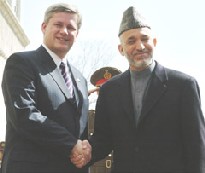
US Senator Elizabeth Dole likes to say in defense of the US invasion of Iraq that it is bringing the poor oppressed people there "Free Market Democracy". Truly American enteprize and business have taken over Iraq;
Judge Radi Hamza Radi, head of the Iraqi Commission on Public Integrity set up in 2004, says corruption has “exploded" since the fall of Saddam Hussein’s regime in 2003.
US auditor lists failures in rebuilding of Iraq
The top auditor of the US reconstruction effort in Iraq yesterday detailed a series of failures, including a $218.5 million emergency radio network that doesn't work, a hospital that is turning out to be twice as expensive as planned, an oil pipeline that is spewing lakes of crude oil onto the ground, and a prison that was meant to hold 4,400 inmates but can house only about 800.
Stuart Bowen Jr. , the special inspector general for Iraq reconstruction, cited multiple causes for the failures at a Senate hearing yesterday, among them the growth of the Iraqi insurgency, poor planning by the US government, and corruption in the Iraqi government.
But he also took aim at the ``cost-plus" contracts given to American construction firms -- including Bechtel, part of the consortium that oversaw Boston's Big Dig -- which guaranteed profits on top of the cost of the project, even with huge overruns.
Thats Iraq now ask yourselves what is happening in Afghanistan? Same thing.
"Everybody complains about corruption in government administration, especially with the
 judiciary," Hazami told The Associated Press.
judiciary," Hazami told The Associated Press. NATO faces a culmination of challenges aside from the Taliban military threat. The poppy culture of the south runs the local economy and serves the interests of the Taliban. It is run by tribes that live on both sides of the border with Pakistan, forging stronger ties amongst themselves and pushing any allegiance with Kabul further away. The area is dominated by a Pakistani sphere of influence; politically, economically and socially. Many businesses trade the Pakistani rupee as a means of legitimate currency and cross border trading and businesses are only second to opium production as the most profitable commercial activity in the area. This is a tough challenge for international troops to overcome as they try to prop up a central government’s control where it is already widely mistrusted and unwanted.
NEWS ANALYSIS: Rogue States Within States Pose Growing ThreatAlthough the United States largely destroyed al Qaeda's haven in Afghanistan, the terrorist network remains the world's most feared -- and probably the hardest to contain -- transnational group.
"The only thing that we found works is if we can convert (groups like al Qaeda) ... isolate them in a state, so that it looks more or less like a state threat," said Chet Richards, a former U.S. Air Force Reserve air attache to Saudi Arabia, who has written extensively about nontraditional enemies the United States is likely to face in the 21st century.
"We did it in Afghanistan. But once ... you've taken down their main state basis, they become basically organized crime."
Although it lost control of Afghanistan in 2001, the Taliban has returned -- this time, as a nonstate actor, which in recent months appears to have gone from strength to strength, launching incursions into Afghanistan out of the tribal provinces of western Pakistan, where the Pakistani government has been unable -- or, some experts say, unwilling -- to rein it in.
Also See:
Iraq
Afghanistan
Find blog posts, photos, events and more off-site about:
Iraq, Afghanistan, Corruption, Halliburton, Bechtel, USA, Dole, Free-markets, democracy, bribery, opium, Taliban, Pakistan, Kazami
No comments:
Post a Comment